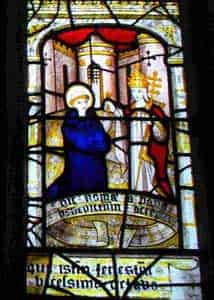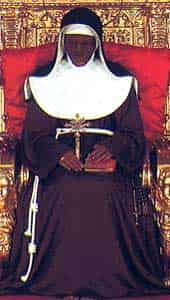Saint Neot Catholic Saint
CATHOLIC SAINTS 28-12-2023, 19:39

Saint Neot
Catholic Saint
st.Neot-Monk of Glastonbury, England
Feast Day : July 31; in Cornwall, the last Sunday in July
Patronage: St. Neot, Cornwall
Neot was revered especially in Cornwall, where his name is preserved in the town of St. Neot (pronounced Need). Several accounts of the life of Neot exist, dating from the 12th to 19th centuries. The conflicting information in them has led some historians to think that there may have been two Neots, one Cornish and another Saxon. This, however, cannot be proved from existing records. Perhaps the most consistent and reliable accounts come from Latin versions dating to the 12th century. Even these accounts likely contain the fictions attributed to many saints, in terms of their virtues and holy deeds. Neot was said to have been born in East England, and was a scion of the royal house of East Anglia. Drawn to religion early in life, he became a monk at Glastonbury and was a model of behavior. Visited often by angels, he was informed by them not to hide his light under a bushel but to preach God’s word far and wide.
Neot did as instructed, and became famous; people flocked to him. He was then instructed by a heavenly oracle (probably an angel) to go elsewhere to practice a life of virtue. He became a hermit on the Bodmin Moor, where the town of St. Neot is now. A well is dedicated to him. The well supplied Neot with fish every day. Three fish always swam in it. God instructed Neot to take one fish a day for his food. He would express his gratitude by standing in the well waters with naked limbs reciting the Psalter. One day Neot felt sick and could eat nothing at all. His alarmed companion and servant caught two fishes (one account says three fishes) and cooked them in different ways. Neot was so upset that he jumped up from his sickbed, threw the dishes into the well and prayed until three fishes again swam in the well. For seven years Neot lived as a hermit, and then went to Rome, where he visited the tombs of SS. Peter and Paul. He was honored by an unnamed pope. He returned to Cornwall, where he continued his devotional life and healed many people. He was visited often by angels. King Alfred the Great (r. 871–899) heard of Neot’s fame and sought him out for his blessing. Neot rebuked him for his wickedness. In one or perhaps two dreams, Neot appeared to the king and prophesied correctly that Alfred would have much travail and would even temporarily lose his kingdom. He also said that he himself would soon die, and God would then bless the king.
Neot soon fell ill. According to legend, he died while praying and preaching to his flock. Great multitudes attended his funeral, where many were healed of sickness. His body was buried in the church, which became filled with sweet smells of flowers and spices. Those who breathed in these odors were healed. Dust from his tomb was taken to be swallowed for the healing of humans and animals alike. His remains were removed to a shrine north of the altar. Neot appeared to the custodian and asked for his relics to be removed to an unnamed resting place. This the custodian did, which upset the townspeople. When men tried to take Neot’s body back to the church, it could not be moved. An unnamed English king ordered the relics to be left where they were. There are conflicting accounts as to whether relics remained in St. Neot, or were taken elsewhere, perhaps to St. Ives.
Neot’s date of death is 877; some place it nearer to 880. One hundred years later, his relics were taken from Cornwall and sent to the monastery founded by the Saxon Leofric at Eynesbury, near St. Ives, Cambridgeshire. Stories associated with Neot appear in the lore of other Celtic saints of the area. Similar stories of magic fishes are told about SS. Corentin and Petroc. Neot also is said to have saved a doe from hunters (a story also told about Petroc) and had his plough pulled by stags (a story told about St. Kea). The 16th-century church of St. Neot has preserved the story of its patron saint in its stained-glass windows.

The Wisdom of Solomon Chapter-19 Wisdom 19:1 But the impious, all the way to the very end, were overcome by...
Learn more.jpg)
Acts 22:1-30 THE HOLY BIBLE The Acts Of The Apostles Chapter 22:1-30 Acts 22:1 "My brothers and...
Learn more
Saint Catherine of Bologna Catholic Saint st.Catherine of Bologna-Mystic, writer, artist and Poor Clare...
Learn more


